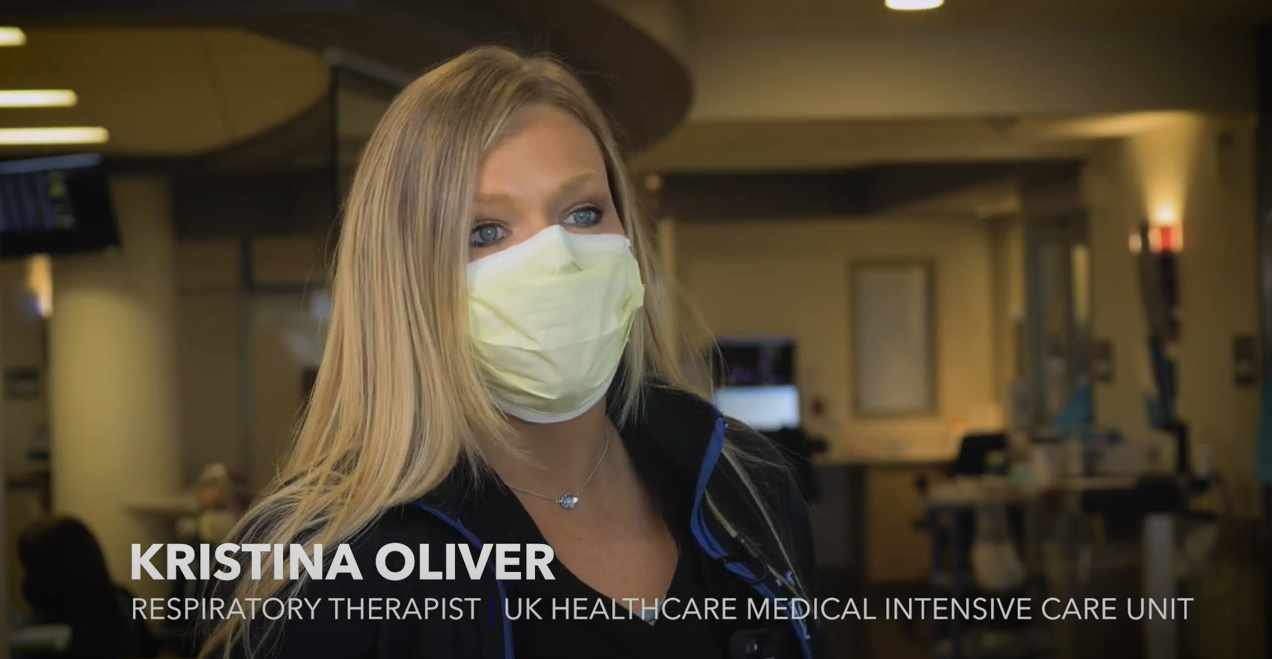Voices from the Front Lines: Kristina Oliver

We recently joined hospital staff for a few days to document the reality of treating COVID-19 patients in UK HealthCare clinical settings.
This edited interview is part of our ongoing series, “UK HealthCare: Voices from the Front Lines,” highlighting stories and perspectives from our frontline staff who have been caring for the sickest COVID-19 patients since March 2020.
Kristina Oliver, RRT, is a respiratory therapist who works in several clinical areas.
What’s the experience treating COVID patients been like?
Sadness is something that we deal with routinely. But, unfortunately, during COVID that became very, very routine. You can only do so much with the ventilator, but it's gotten to the point to where we've exhausted all of our resources and … you feel exhausted and exasperated when they're so sick and there's nothing you can do.
Once we put patients on a ventilator, we actually work with the doctors as well as the nurses and the rest of the team to optimize that. Then later, our goal always is to get someone off the ventilator as quickly as possible. With COVID, that's made that challenging, though. We’re trying to do the best with what we can to get them better and out of the ICU as quick as possible.
What’s the process of putting someone on a ventilator like?
A lot of times you're conscious before being put on the ventilator, but we give medications to make that more comfortable. Sowhen you get put on the ventilator, you're very sedated. Now, we do wake you up and that can be very uncomfortable for the patient, but we do make sure that you're sedated as much as possible. There are other patients that are vented and we keep them very much awake so that they can sort of manage their own respiratory drive, and that's very, very uncomfortable. But whatever's best for them at the time, we do.
How long might patients remain on a ventilator?
Oh, we've had patients remain on this floor for months and months and months. We had one patient that was ventilated for six to eight months here in the hospital. And it seemed like when we were getting a little bit of headway and climbing a little bit up the mountain, something else would happen and we would just slip back down.
Are there any specific memories or moments that stand out to you about your time treating COVID patients?
There are so many that it's honestly difficult to count. Unfortunately, we've seen people as young as 24 weeks to 80 years old lose their lives due to COVID. Oftentimes it's been a respiratory therapist and a nurse only in a room, and it's very surreal to be there and know that you are the last person to share in that person's life moments. And I can remember so many of their faces, so many of their names, and so many of their family members on the TV screen. And there's so many that I don't think that I will ever forget. It's been very traumatic.
What keeps you coming back to work?
I actually lost my father when I was 16 and then my stepfather at 20, both from terminal cancer. So, I know what it's like to be on both ends of the spectrum, both as a family member and as a caregiver. And I just feel like that I owe it to our patients when their families can't be here to be here; to do what I can to get them well.
What’s it been like for the staff?
Morale has had its low points; it's had its high points. I don't want to say that this has all been tragedy. We've had a few small victories. All of us have grown together. And I think that we've held each other up and cried together and just got through it. But I would say that with this most recent surge, a lot of us feel defeated.
What’s the most important thing you’d like people on the outside to know about what’s happening in the hospital?
I think that out in the community, it's difficult for people to put themselves in this position. I think it's easy to say, ‘that would never happen to me,’ or ‘that would never happen to one of my loved ones.’
I think it's easy to take our health for granted, and that's something we're all guilty of. I'm guilty of that. But, just as you wouldn't walk in the middle of the interstate and expect for nothing to happen, I think we need to treat COVID that way. We need to do everything that we can to take care of ourselves and in turn, take care of others, because this is very, very, real and very, very, serious.




